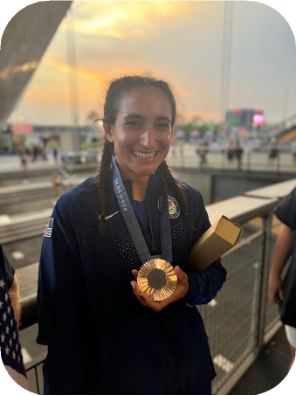
Sarah Levy, Team USA Rugby –2024 Bronze Medalist (Team USA)
Sarah Levy took part in the 2014 March of the Living as part of the March of the Living Western Region Delegation.
Eli Rubenstein: congratulations on this incredible achievement. How are you feeling right now? And what was your feeling right after the experience when you received the medal?
Sarah Levy: Well, I don’t think it will feel real for a while. It always seemed like, going into it, it always felt like a pedestal that we would never get to. Sometimes in my brain, it was the goal, but to get it just seems just like that. The whole process of everything I did in the past three years just seems to all fit together so well. Everything makes sense and everything happened for a reason.
Everything was working toward this eventual outcome.
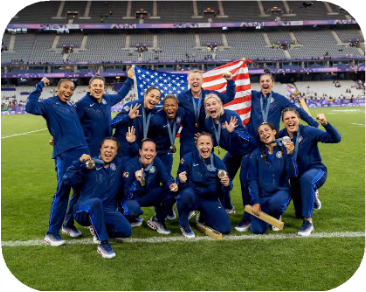
The United States 2024 Women’s Bronze Medalist Rugby Team – Sarah Levy, second from right. (Team USA)
ER: And how many years were you working towards that goal?
SL: Well, since Tokyo, I mean the team as a whole, we’ve been building a culture and a mindset going into this Olympic cycle of the team we wanted to be. We created a set of values that we wanted to follow as a team, which were: courage, selflessness, love, work ethic and resilience. And those values guided our every day. And we created this culture surrounded by that – keeping accountability and, we were trying to inspire the next generation by getting a medal. And it just brought so many eyes to the sport – just getting bronze – that it really opens so many doors for the future, and for LA 2028.
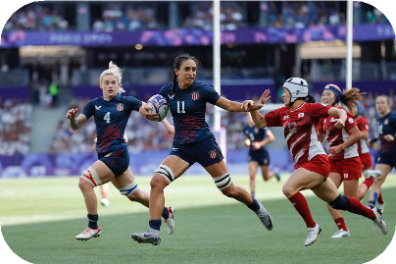
Sarah Levy (second from Left) at the 2024 Paris Olympics (Team USA)
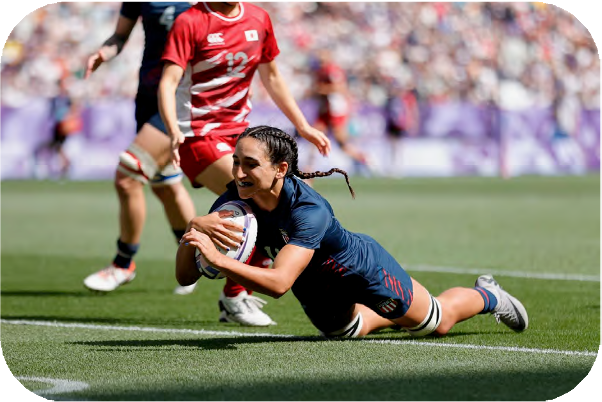
Sarah Levy competing for the US in Rugby Sevens at the 2024 Paris Olympics (Team USA)
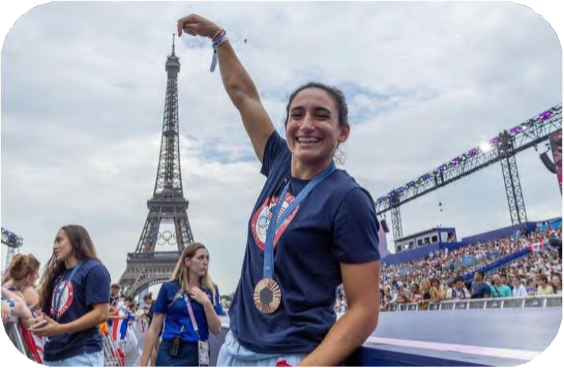
Sarah Levy (right) wearing her Bronze Medal at the 2024 Paris Olympics (Team USA)
ER: What was the general atmosphere like for you at the Olympics?
SL: Going into the Olympic Village, I was a little nervous about what tensions were going to be like with all the countries together all at once. I was definitely nervous going into it. And then I got here, and it just felt almost like a utopian society where it doesn’t feel like there are any politics or anything political going on. It feels like everyone is living in harmony, at least from the surface level that I could feel.
ER: Well, it’s nice to hear that. More broadly, you are an American, you’re a young Jewish woman. You’re representing your country; you’re representing your people. How does that feel in general?
SL: Well, there aren’t that many Jewish rugby players. One of my assistant coaches, Zach, is also Jewish, and he played in Rio Olympics. But I know having a Jewish last name that people probably know that I’m Jewish. And I think that in general, younger girls or boys who are Jewish, and are interested in rugby, it just gives a little bit more representation that there is someone who’s Jewish on the team. Just maybe it makes [a young Jewish girl or boy] feel a little more comfortable with thinking like “oh, I grew up with a similar upbringing to her, and with similar values. So that can Inspire others to do the same move from the Jewish community.
ER: So, let’s go back a little to your history. You were born in South Africa, but moved to Israel, then to San Diego where you were brought up. Did you have a Bat Mitzvah?
SL: Yes.
ER: And did you do a good job?
SL: I’d like to think so, but I was also 13. Yeah, it was nice. My parents told me, since we had a lot of friends and some distant family in Israel, they’re thinking how meaningful it would be if I had my bat mitzvah in Israel. I read from the Torah, and I did a Devar Torah. It was about Joseph forgiving his brothers.
ER: That’s one of the most beautiful portions in the Torah.
SL: Yeah. I really liked it because I always loved that story, the story of Joseph and his brothers.
ER: That’s wonderful. So, was it a meaningful experience to have your Bat Mitzvah in Israel?
SL: Yeah. it was really meaningful.
And I think, well, it was my first time back to Israel since I was a kid. So, it was probably my earliest memory of it in general.
ER: And it was meaningful because all your family came together – and how often do you have that experience? Right?
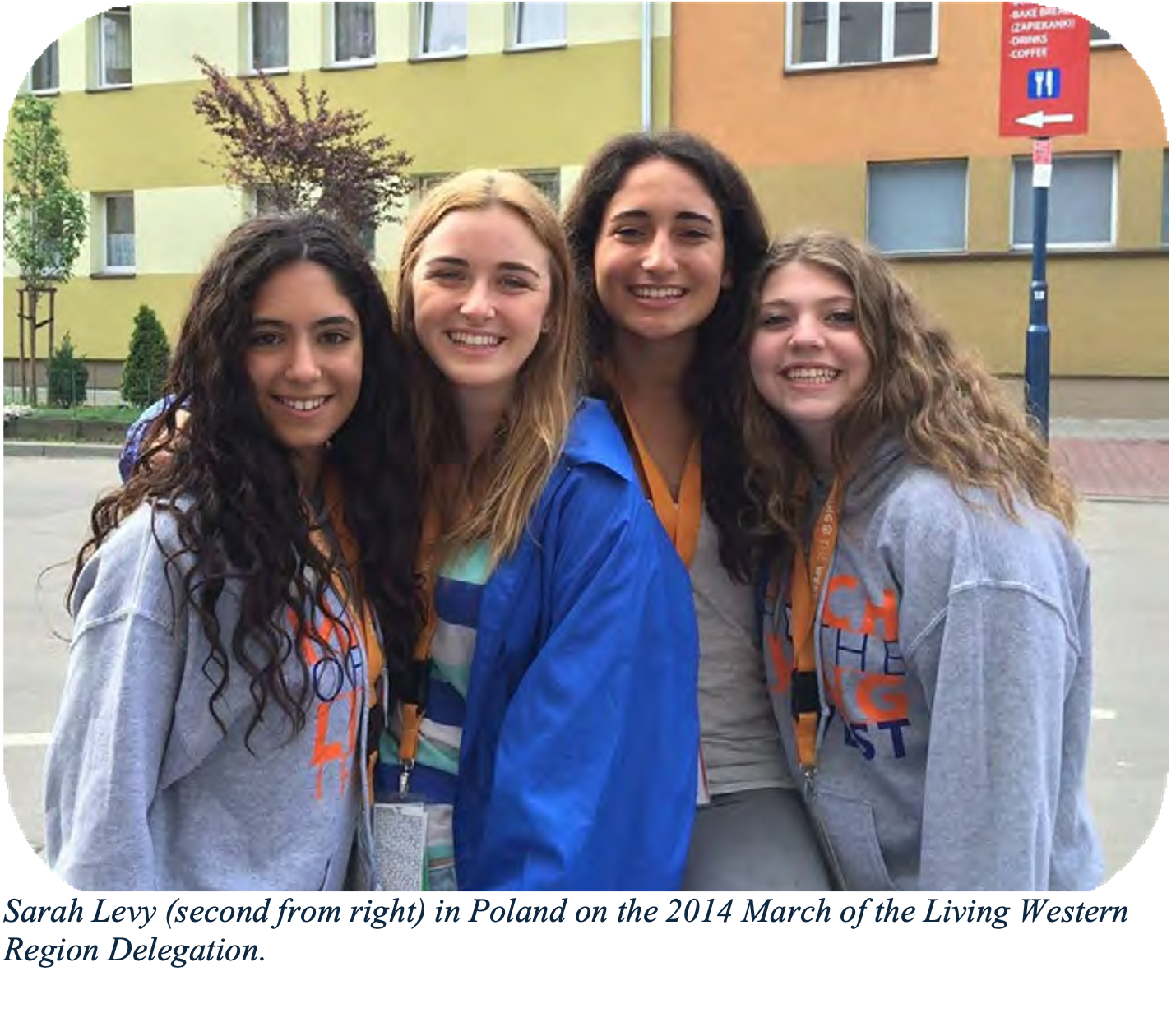 ER: To your roots. Now, can we talk about your March of the Living experience for a few minutes? So, how old were you when you went on the March?
ER: To your roots. Now, can we talk about your March of the Living experience for a few minutes? So, how old were you when you went on the March?
SL: I was 18.
ER: And you were in high school at the time?
SL: Yeah, University City High School in San Diego. Yeah, it was the last month or two of high school.
ER: And what prompted you to want to go on the trip?
SL: When I was younger, I always read so many books about the Holocaust, and I always was really interested in all the stories and just all the history behind it. I think I really connected to it being Jewish, and I think that I remember hearing about the concentration camps and that I really would want to see them. And I just couldn’t wrap my head around something like that ever
happening. So, I wanted to be able to see that and see that history and really materialize it for me.
ER: And so, tell me, what was the experience like? And let’s start with Poland. What was your experience?
SL: I remember when I first got there, I was like, oh my gosh, this country is so beautiful. And then as we went through the tour and we went to all these historical sites, there was just all this sadness, a heaviness all around. And it almost transports you back in time to what happened there. You can feel what it would’ve been like back in World War II, overrun by soldiers. It does materialize all the stories that you’ve read about.
ER: Here is an excerpt from your diary that you wrote in 2014 after visiting the Belzec Death Camp memorial, where some 500,000 Jews were murdered and virtually no one escaped.
Belzec – by Sarah L April 29, 2014
“The monument we just visited was not like any I’d seen back home. The single passageway and looming walls created an overwhelming experience. All the Jews that arrived at this camp were killed, except for just one. All Jews. All the same fate. No other option. The huge walls in a narrow passageway made me feel the same sense of helplessness.None of my friends could ever understand the emotional journey on this trip, which made me feel alone, but the people with me on this trip created a loving community and helped me through this incredible experience every day.”
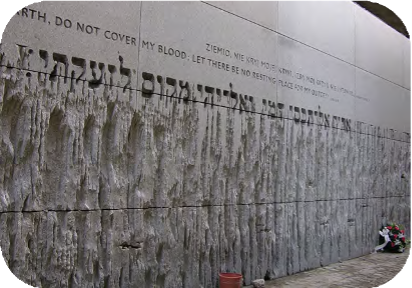
Mausoleum at the former Belżec death camp.
ER: How does it feel reading those words today, 10 years later?
SL: I think my first reaction was, well, it was really cool that you guys still have all of those. That you memorialized my emotions from that time, which is really important. And that also, this specific passage reminded me exactly of that concentration camp in Belzec.
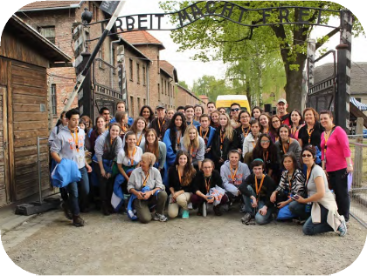
2014 March of the Living Western Region Delegation at Auschwitz
I remember exactly that moment. I can literally see the photograph in my mind and remember
exactly that moment when I was there and hearing the story I feel like those memories don’t come up that often, but to read that, that brought it back. Even if I don’t think of them all the time, I still have all these deep-seated memories from that trip. It triggered the emotion of that moment, of shock, of sadness. No one really survived except for one guy that was able to somehow get out to escape.
ER: And then the last paragraph, you talk about how your friends helped you through that day, right?
SL: I think that that’s why we see communities that share the same values, because you’re able to have a support system that has more empathy towards how you feel.
Whether that’s in the Jewish community or in rugby in general, that you find people that share those values – so that during the hard times they can help lift you up or give you advice or let you know they can understand how you feel.
ER: So, there’s an interesting parallel between being in that experience on the March of the Living with your community 10 years ago and going through the rugby championships with your own fellow players, that you had that sense of comradery and shared values.
Did you travel with survivors?
SL: Yes.
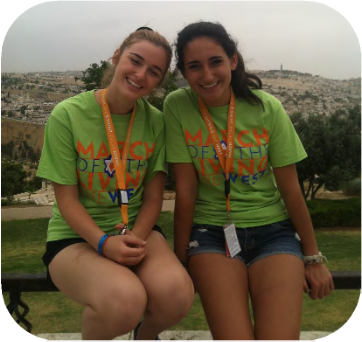
Sarah Levy (right) on the 2014 March of the Living in Israel
ER: And what was that like?
SL: I remember it being really emotional because got to know this couple (Mike and Manya Wallenfels), they’re part of our group and everything, and then they share their story, and then I remember going to certain sites and then you could see some memories coming back, and them thinking about family members they had and lost. (See profiles of these 2 Holocaust survivors on the March of the Living website here: Mike Wallenfels & Manya Wallenfels
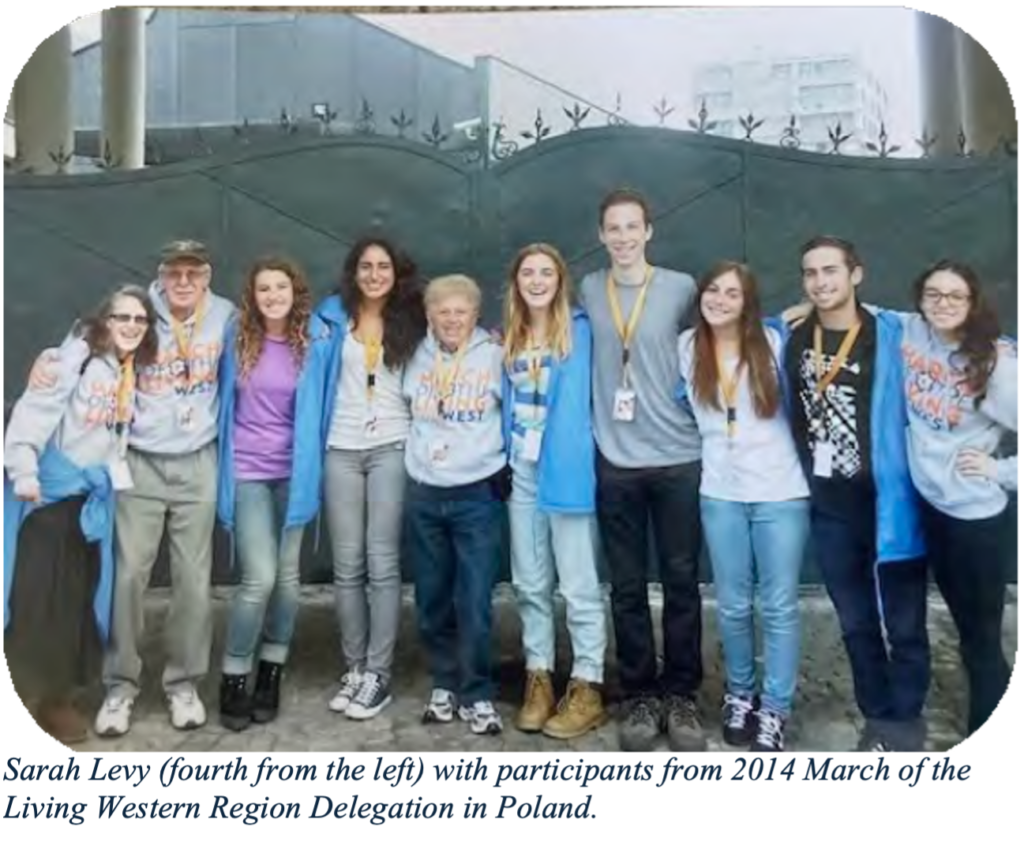
ER: And what was the most meaningful emotional part of your trip to Poland?
SL: Definitely the March from Auschwitz to Birkenau. And I remember because then they had a lot of speeches and everything, and I remember just getting extremely emotional, I think the Prime Minister of Hungary spoke then about the 70th anniversary of the loss of Hungarian Jews in the Holocaust.
ER: And how did the March itself feel when you’re marching with thousands of kids from Auschwitz?
SL: It was interesting to be part of such a small group, and then eventually growing into such a big group of Jews from all over, and people from all over. It made you feel like a part of something bigger. I think I ran into someone I knew from one of my sleepaway camps from years back, from those eight years before that. So, it was really interesting to even run into someone I knew all the way across the world.
ER: What was Israel like?
SL: It was very much a complete 180 in emotion from that heaviness and sadness in Poland. It was a great time. It was just so much fun and celebratory. I just remember it being such a great experience. I had been there before, so it did feel a little bit more comforting and more like home.
I made such great friends on that trip. I remember being so much closer to them than I had on a lot of other trips. I made some great connections. In fact, after winning the bronze medal in Paris, a lot of friends I’ve had from the March of the Living reached out to me.
ER: I think it’s great that these deep connections lasted over all these years. These are formative experiences.
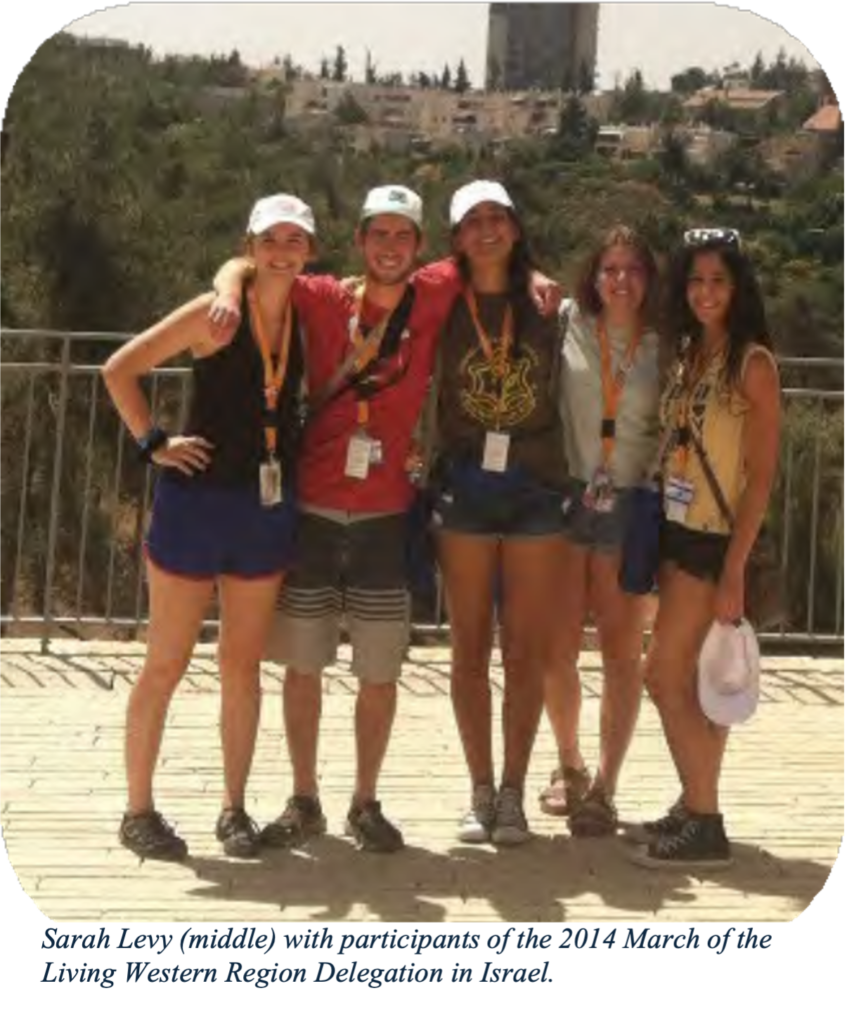
Any closing thoughts that you’d like them to take from your example of sportsmanship and comradeship and resilience and courage and love and all those kinds of things? Anything that you’d like them to learn from your experience?
SL: Yeah, I think that whether you’re religious Jew or not, I think I, it’s important to find a community that supports the same values that you like to live by. And when I started playing rugby, I felt like that was a community that it shared a lot of values that the Jewish religion shared, at least to me personally. I felt like it was very inclusive and really welcoming and just overall, it felt like home right from the start, how I felt growing up in a Jewish community. So, I just hope that no matter what you do, that you find a community like that that emulates those same values.
ER: Very beautiful. What does the future hold in store for you?
SL: I’m still in physical therapy school. When I get back, I’ll be starting my last semester and then taking a six-month break from rugby to finish my clinical rotations, and then I’ll finally get my degree and then hopefully training for LA 2028. I want to be a physiotherapist, So hopefully start my full-time career at 32, but I would like to start working part- time in a year or so.
ER: How many more Olympics do you want to go to?
SL: Hopefully just one – I am taking it year by year. I’m for sure going to play one more year – after that I’ll get back to you.
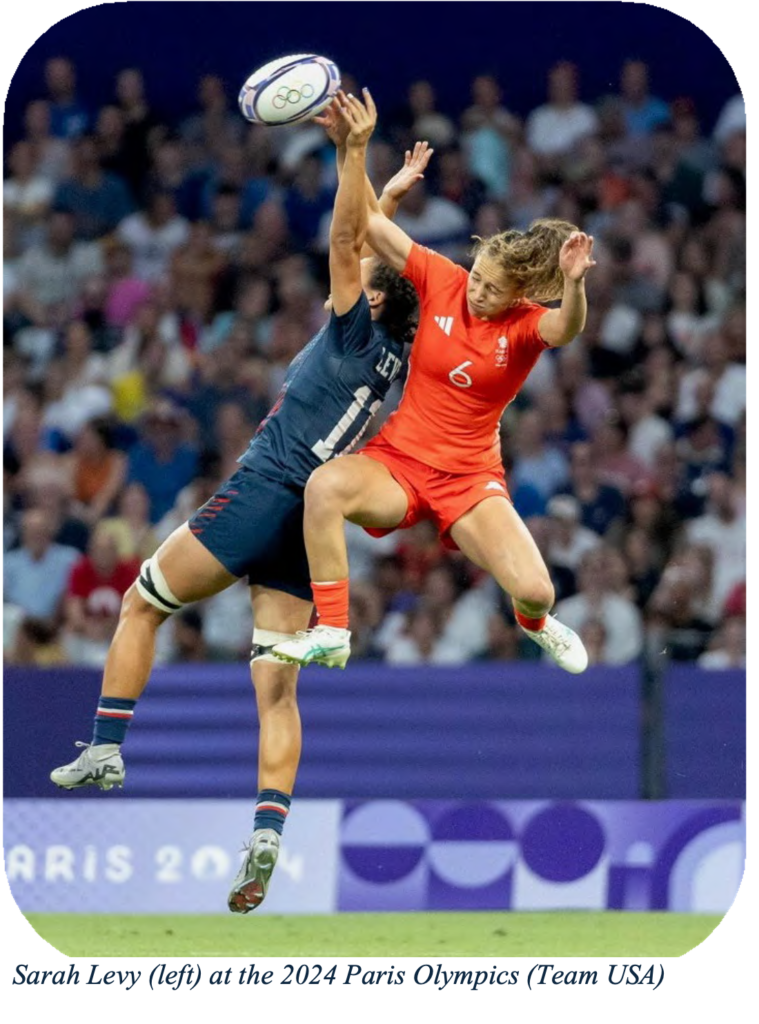
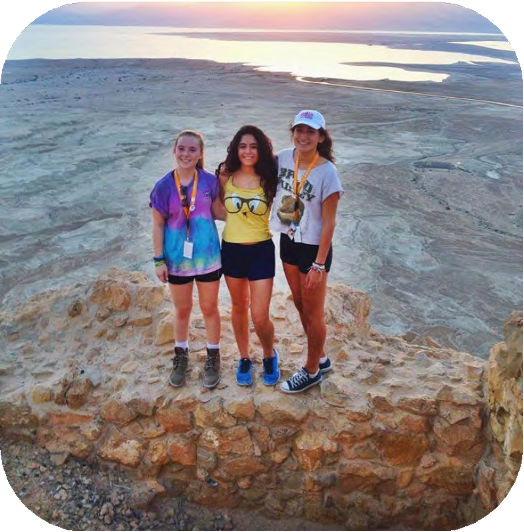
Sarah Levy (right) with friends at Masada, Israel with the 2014 Western Region March of the Living Delegation
Photos: Team USA, Alex Ho, Sarah Levy, and Marcia Wollner/International March of the Living








